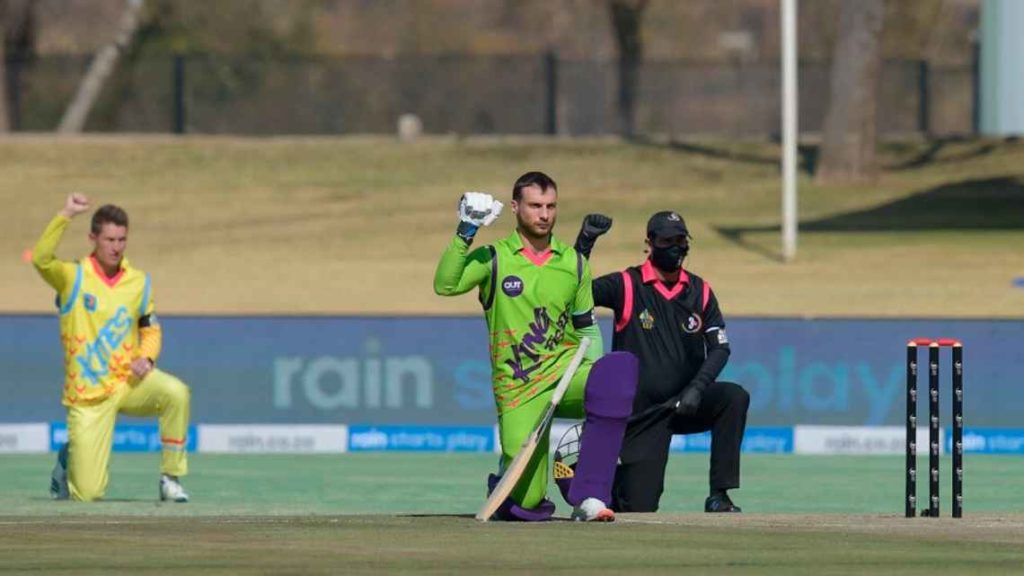The Proteas’ stance on kneeling is confusing at best, frightening at worst, and showcases the complexity of teams taking an agreed position on issues that polarise individuals within those teams, writes RYAN VREDE.
On Monday morning, the media were granted an opportunity to speak with Kagiso Rabada. At the height of the Black Lives Matter movement, Rabada was an outspoken advocate for one of the movement’s fundamental messages – equality of opportunity for all.
I was interested to hear his views on why the team has made the decision not to kneel prior to the commencement of matches in their white-ball series against England. This, remember, is the first time the Proteas have played since kneeling became a symbol of solidarity with the BLM cause.
There are two primary schools of thought on this, I offered. The first is that the symbolism of kneeling is powerful and a reminder of why the movement started and continues well after its last catalyst – the death of George Floyd at the hands of an American police officer. To not kneel, or stop kneeling, as many sports codes have done, carry the risk of people forgetting about the movement’s cause and the incidents of racial injustice that sparked or reignited the movement.
Simply put, it would be a moment in social justice history, rather than it being a sustainable and deeply impactful cause.
The second is that the situation should move from symbolism to practical ways of creating equal opportunities for all.
‘I’ve already expressed my views on that. So, ja. I’ll see if I want to express them again. It’s something that [people need to be] constantly reminded of. But I’ve spread my views on that for now,’ Rabada said.
I was confused. Mark Boucher had made the issue newsworthy last week when he said the team decided to not to kneel. I wanted to understand how this sat with the most senior black African in the squad. So I pressed Rabada, explaining my view on the two primary schools of thought, and asking where he stood.
‘That’s a tough question. Let me think about it. I’ll answer the next question,’ Rabada said.
A couple of questions later, my media colleague Dan Gallan pressed the issue further. He asked how the team came to the decision not to kneel, and if Rabada was involved in it.
‘We spoke about it as a group,’ Rabada began. ‘There are lots of things to look at these days. To me, black lives matter, and we’re also looking at gender-based violence. Black lives will always matter, and all lives will always matter, but the situation now is black lives matter.
‘I will always stand for that, but it was a team decision not to kneel and to look at gender-based violence and devote ourselves to that cause. I’ll always believe in black lives matter. Mark has stated that the team will not be kneeling and that’s how it’s going to be.’
This confused me more. So, as a team, the Proteas have decided to park the issue of racial injustice, in order to tackle the equally important issue 0f gender-based violence?
I understand the complexity of standing for one thing when there are so many urgent causes in South Africa. This feels like a cop-out, though.
There is a distinct sense of incompleteness about the work the Proteas have done on the Black Lives Matter front. Either this, or they’ve done a poor job in communicating their thinking and/or exhibiting their action plan as it pertains to the present and future in this regard.
I agree that symbolism only takes the cause so far. But if you make a decision to move from symbolic gestures to action, you have to, well, do something. In the absence of this action, the symbolism counts for very little.
The Proteas can be many things to many people in the context of raising awareness of issues that plague South Africa. To make a hard move from one issue to the next suggests they haven’t fully comprehended the magnitude of either.
At what point do they decide to stop their awareness campaign around gender-based violence? It’s all awfully confusing.
Perhaps it is too much to ask elite sports teams to take powerful and meaningful stances on issues like these. Perhaps their role is simply to create awareness of the issues, given that the team is comprised of many different individuals, who all have different ideologies and philosophies on how to best deal with these issues.
I recall, earlier this year, the outcry when a clutch of mostly South Africans playing rugby for Sale Sharks chose not to kneel. I didn’t understand why they were being vilified. They were simply exercising their free will in the same way those who chose to kneel were.
If I were a professional athlete, I’d kneel because the BLM cause resonates with me. That doesn’t mean I get to make a moral or character judgement on those who stand.
This makes the Proteas’ team decision not to kneel perplexing for me. I may have read this completely incorrectly, but based on Rabada’s non-verbal and verbal cues, I’d make an educated guess that, given the option, he’d kneel in solidarity with the BLM cause.
To deny him, and others who may support the movement, of the opportunity to display their solidarity with the movement because of groupthink isn’t right. It would be equally wrong to force those who don’t want to, to stand.
Each man must be given the freedom to exercise his freedom. Groupthink, in this context, is toxic.







